孩子学英语不是盖房子而是煮米饭 (1)
- 格式:doc
- 大小:31.00 KB
- 文档页数:2
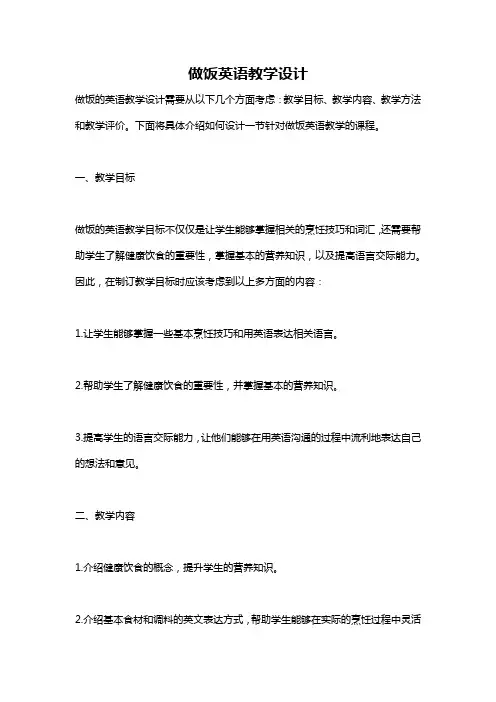
做饭英语教学设计做饭的英语教学设计需要从以下几个方面考虑:教学目标、教学内容、教学方法和教学评价。
下面将具体介绍如何设计一节针对做饭英语教学的课程。
一、教学目标做饭的英语教学目标不仅仅是让学生能够掌握相关的烹饪技巧和词汇,还需要帮助学生了解健康饮食的重要性,掌握基本的营养知识,以及提高语言交际能力。
因此,在制订教学目标时应该考虑到以上多方面的内容:1.让学生能够掌握一些基本烹饪技巧和用英语表达相关语言。
2.帮助学生了解健康饮食的重要性,并掌握基本的营养知识。
3.提高学生的语言交际能力,让他们能够在用英语沟通的过程中流利地表达自己的想法和意见。
二、教学内容1.介绍健康饮食的概念,提升学生的营养知识。
2.介绍基本食材和调料的英文表达方式,帮助学生能够在实际的烹饪过程中灵活应用。
3.教学基本烹饪技巧,例如切丝、切片、煮蒸、炒等,让学生能够掌握基本的烹饪技巧。
4.介绍不同类型的菜品和菜单,在学生的实际烹饪中培养综合的能力。
5.带领学生进行实际的烹饪练习,让他们能够通过实践掌握并应用所学知识。
三、教学方法1.听力训练:通过听取录音、观看视频等方式,让学生学习不同菜品和调料的英文表达方式。
2.口语训练:组织学生进行角色扮演、小组讨论等形式的活动,让他们在实践中提高口语表达。
3.实践训练:将学生分成小组,让他们亲自进行烹饪练习,加深对所学知识的理解和掌握。
四、教学评价1.口头答辩:通过学生口头回答老师提出的问题的形式,让老师了解学生对所学知识的掌握程度。
2.写作练习:要求学生撰写关于做饭内容的小议论文、日记等,考察他们对所学知识的应用情况。
3.实践考核:通过学生在实际烹饪中的表现,评价其对所学知识的掌握情况和应用水平。
以上是关于做饭英语教学的设计方案,旨在通过综合教学方式提高学生的语言交际能力和实际烹饪技能。
教师可以根据学生的年龄、英语水平、教学环境等因素进行必要的调整和改进,以达到更好的教学效果。
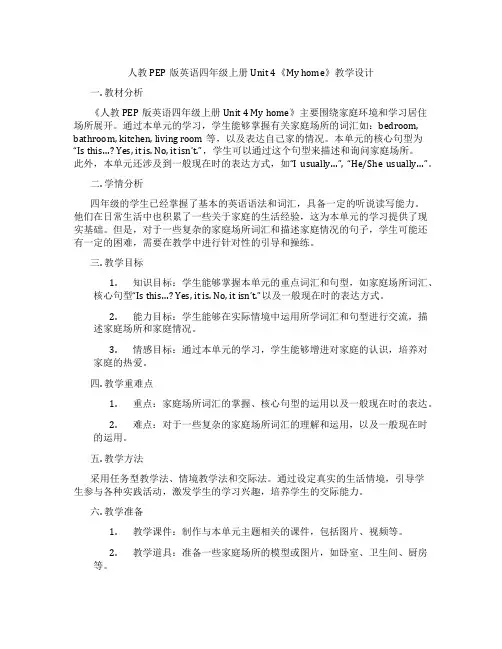
人教PEP版英语四年级上册Unit 4《My home》教学设计一. 教材分析《人教PEP版英语四年级上册Unit 4 My home》主要围绕家庭环境和学习居住场所展开。
通过本单元的学习,学生能够掌握有关家庭场所的词汇如:bedroom, bathroom, kitchen, living room等,以及表达自己家的情况。
本单元的核心句型为“Is this…? Yes, it is. No, it isn’t.”,学生可以通过这个句型来描述和询问家庭场所。
此外,本单元还涉及到一般现在时的表达方式,如“I usually…”, “He/She usually…”。
二. 学情分析四年级的学生已经掌握了基本的英语语法和词汇,具备一定的听说读写能力。
他们在日常生活中也积累了一些关于家庭的生活经验,这为本单元的学习提供了现实基础。
但是,对于一些复杂的家庭场所词汇和描述家庭情况的句子,学生可能还有一定的困难,需要在教学中进行针对性的引导和操练。
三. 教学目标1.知识目标:学生能够掌握本单元的重点词汇和句型,如家庭场所词汇、核心句型“Is this…? Yes, it is. No, it isn’t.”以及一般现在时的表达方式。
2.能力目标:学生能够在实际情境中运用所学词汇和句型进行交流,描述家庭场所和家庭情况。
3.情感目标:通过本单元的学习,学生能够增进对家庭的认识,培养对家庭的热爱。
四. 教学重难点1.重点:家庭场所词汇的掌握、核心句型的运用以及一般现在时的表达。
2.难点:对于一些复杂的家庭场所词汇的理解和运用,以及一般现在时的运用。
五. 教学方法采用任务型教学法、情境教学法和交际法。
通过设定真实的生活情境,引导学生参与各种实践活动,激发学生的学习兴趣,培养学生的交际能力。
六. 教学准备1.教学课件:制作与本单元主题相关的课件,包括图片、视频等。
2.教学道具:准备一些家庭场所的模型或图片,如卧室、卫生间、厨房等。
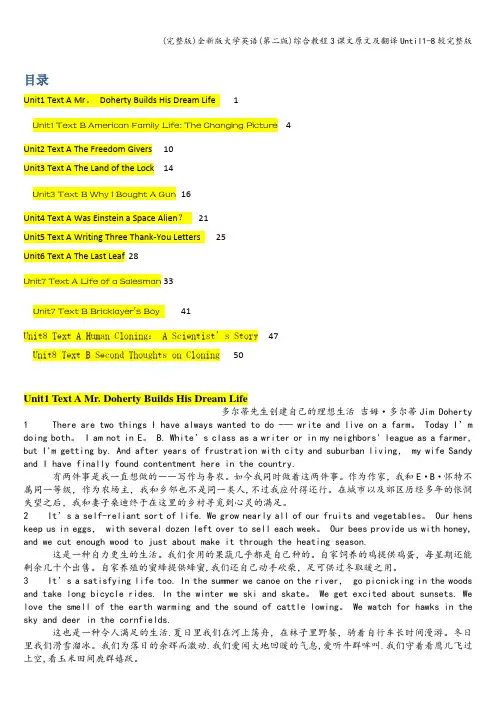
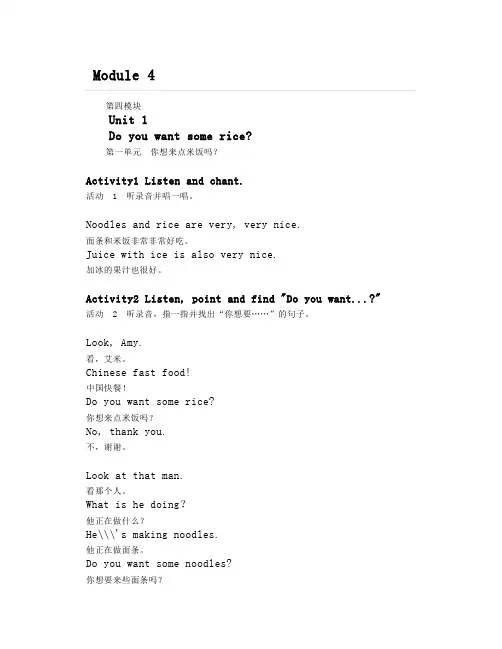
Module 4第四模块Unit 1Do you want some rice?第一单元你想来点米饭吗?Activity1 Listen and chant.活动 1 听录音并唱一唱。
Noodles and rice are very, very nice.面条和米饭非常非常好吃。
Juice with ice is also very nice.加冰的果汁也很好。
Activity2 Listen, point and find "Do you want...?"活动 2 听录音,指一指并找出“你想要……”的句子。
Look, Amy.看,艾米。
Chinese fast food!中国快餐!Do you want some rice?你想来点米饭吗?No, thank you.不,谢谢。
Look at that man.看那个人。
What is he doing?他正在做什么?He\\\'s making noodles.他正在做面条。
Do you want some noodles?你想要来些面条吗?Yes, please.好的,谢谢。
Here are noodles with tomato and egg, and noodles with meat and potato.这里有西红柿鸡蛋面和土豆肉面。
What do you want?你想要什么?Noodles with tomato and egg, please.西红柿鸡蛋面,谢谢。
Mm, it\\\'s nice!嗯,真好吃!Activity3 Listen and say.活动 3 听录音并开口说。
Do you want some noodles?你想要来些面条吗?Yes, please.好的,谢谢。
Do you want some milk?你想喝点牛奶吗?No, thank you.不了,谢谢。
Activity4 Practise.活动 4 练习Do you want some noodles?你想要来些面条吗?Yes, please.好的,谢谢。
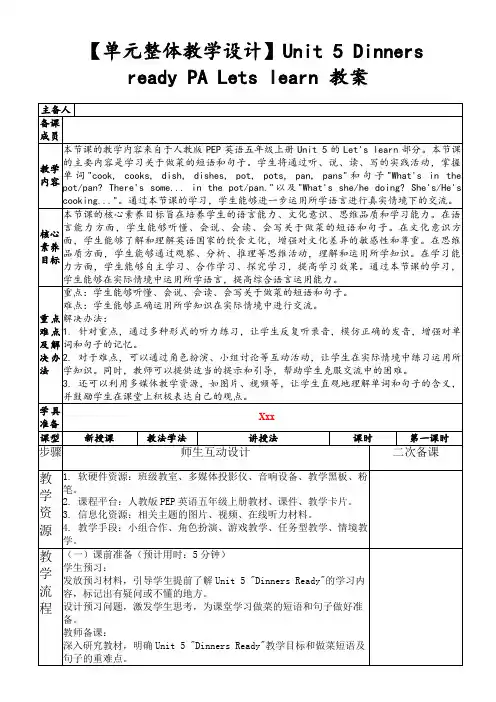
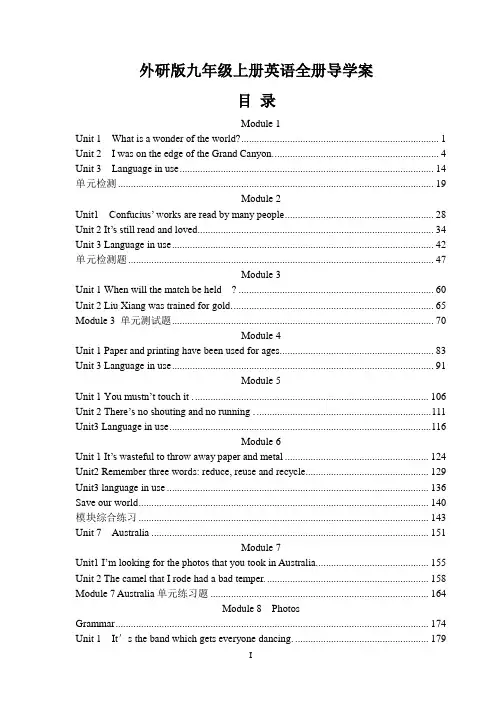
外研版九年级上册英语全册导学案目录Module 1Unit 1 What isa wonder of the world? (1)Unit 2 I was on the edge of the Grand Canyon. (4)Unit 3 Language in use (14)单元检测 (18)Module 2Unit1 Confucius‘ works are read by many people (28)Unit 2 It‘s still read and lov ed (34)Unit 3 Language in use (42)单元检测题 (47)Module 3Unit 1 When will the match be held ? (60)Unit 2 Liu Xiang was trained for gold. (64)Module 3 单元测试题 (70)Module 4Unit 1 Paper and printing have been used for ages. (83)Unit 3 Language in use (91)Module 5Unit 1 You mustn‘t touch it (106)Unit 2 There‘s no shouting and no running . (111)Unit3 Language in use (116)Module 6Unit 1 It‘s wasteful to throw away paper and metal (124)Unit2 Remember three words: reduce, reuse and recycle (129)Unit3 language in use (136)Save our world (140)模块综合练习 (143)Unit 7 Australia (151)Module 7Unit1 I‘m looking for the photos that you took in Austr alia. (155)Unit 2 The camel that I rode had a bad temper. (158)Module 7 Australia单元练习题 (164)Module 8 PhotosGrammar (174)Unit1 It's the band which gets everyone dancing. (179)Unit 2 Read on to find out who the winners are. (184)Unit 3 Language in use (188)单元学情检测 (195)Module 9Module 9 Cartoon stories (209)Unit 2 There are several fan clubs in China which have held birthday parties for Tintin.213 Module 9 Cartoon stories (218)Module 10Unit 1 I‘ve got a friend (231)Unit 2 Jamie is a cook whose ideas are changing school dinners (236)Module 10 Fitness (240)Module 10 单元测评 (246)Module 11Unit 2 It was a quiet country village. (260)Unit 3 Language in use (265)单元检测题 (269)Module 12Unit 1 Your host family is meeting you at the airport. (279)Unit 2 Learn English in Los Angeles. (285)Unit 3 Language in use (291)单元测试题 (297)导学案参考答案Module 1 (304)Module2 Great books (306)Module 3 Sporting life (308)Module 4 Great inventions (310)Module 5 Museums (312)Module 6 Save our world (314)Module 7 Australia (316)Module 8 Photos (319)Module 9 Cartoon stories (323)Module 10 Fitness (324)Module 11 Population (327)Module12 Summer in LA. (330)Module 1 Wonders of the world Unit 1 What is a wonder of the world?课型:听说课一.教学目标:1. 熟练掌握本单元的语言点。
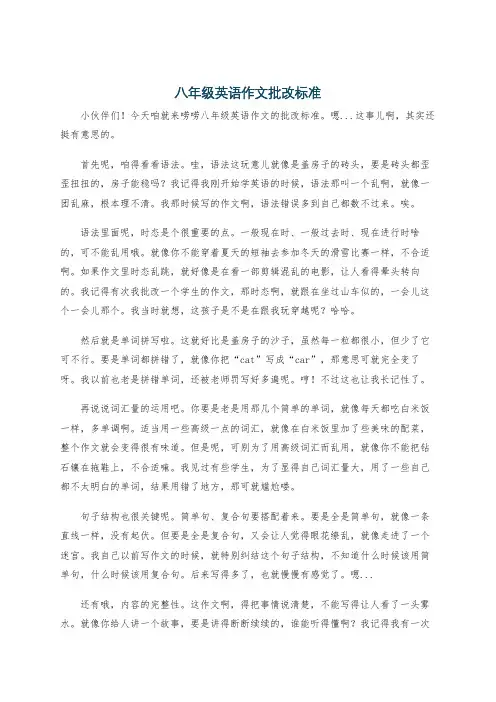
八年级英语作文批改标准小伙伴们!今天咱就来唠唠八年级英语作文的批改标准。
嗯...这事儿啊,其实还挺有意思的。
首先呢,咱得看看语法。
哇,语法这玩意儿就像是盖房子的砖头,要是砖头都歪歪扭扭的,房子能稳吗?我记得我刚开始学英语的时候,语法那叫一个乱啊,就像一团乱麻,根本理不清。
我那时候写的作文啊,语法错误多到自己都数不过来。
唉。
语法里面呢,时态是个很重要的点。
一般现在时、一般过去时、现在进行时啥的,可不能乱用哦。
就像你不能穿着夏天的短袖去参加冬天的滑雪比赛一样,不合适啊。
如果作文里时态乱跳,就好像是在看一部剪辑混乱的电影,让人看得晕头转向的。
我记得有次我批改一个学生的作文,那时态啊,就跟在坐过山车似的,一会儿这个一会儿那个。
我当时就想,这孩子是不是在跟我玩穿越呢?哈哈。
然后就是单词拼写啦。
这就好比是盖房子的沙子,虽然每一粒都很小,但少了它可不行。
要是单词都拼错了,就像你把“cat”写成“car”,那意思可就完全变了呀。
我以前也老是拼错单词,还被老师罚写好多遍呢。
哼!不过这也让我长记性了。
再说说词汇量的运用吧。
你要是老是用那几个简单的单词,就像每天都吃白米饭一样,多单调啊。
适当用一些高级一点的词汇,就像在白米饭里加了些美味的配菜,整个作文就会变得很有味道。
但是呢,可别为了用高级词汇而乱用,就像你不能把钻石镶在拖鞋上,不合适嘛。
我见过有些学生,为了显得自己词汇量大,用了一些自己都不太明白的单词,结果用错了地方,那可就尴尬喽。
句子结构也很关键呢。
简单句、复合句要搭配着来。
要是全是简单句,就像一条直线一样,没有起伏。
但要是全是复合句,又会让人觉得眼花缭乱,就像走进了一个迷宫。
我自己以前写作文的时候,就特别纠结这个句子结构,不知道什么时候该用简单句,什么时候该用复合句。
后来写得多了,也就慢慢有感觉了。
嗯...还有哦,内容的完整性。
这作文啊,得把事情说清楚,不能写得让人看了一头雾水。
就像你给人讲一个故事,要是讲得断断续续的,谁能听得懂啊?我记得我有一次看一篇作文,看了半天都不知道这孩子要表达啥,就像在雾里看花一样。
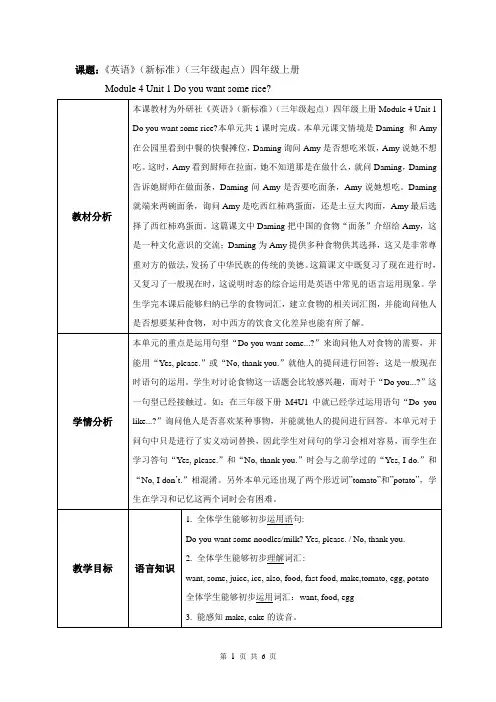
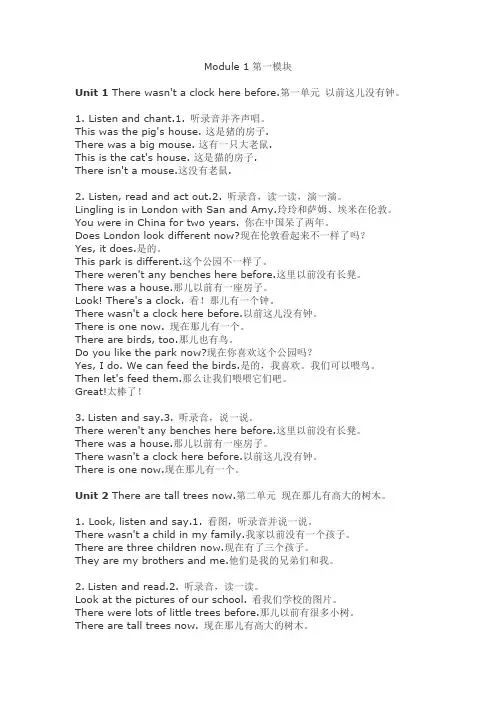
Module 1第一模块Unit 1 There wasn't a clock here before.第一单元以前这儿没有钟。
1. Listen and chant.1. 听录音并齐声唱。
This was the pig's house. 这是猪的房子.There was a big mouse. 这有一只大老鼠.This is the cat's house. 这是猫的房子.There isn't a mouse.这没有老鼠.2. Listen, read and act out.2. 听录音,读一读,演一演。
Lingling is in London with San and Amy.玲玲和萨姆、埃米在伦敦。
You were in China for two years. 你在中国呆了两年。
Does London look different now?现在伦敦看起来不一样了吗?Yes, it does.是的。
This park is different.这个公园不一样了。
There weren't any benches here before.这里以前没有长凳。
There was a house.那儿以前有一座房子。
Look! There's a clock. 看!那儿有一个钟。
There wasn't a clock here before.以前这儿没有钟。
There is one now. 现在那儿有一个。
There are birds, too.那儿也有鸟。
Do you like the park now?现在你喜欢这个公园吗?Yes, I do. We can feed the birds.是的,我喜欢。
我们可以喂鸟。
Then let's feed them.那么让我们喂喂它们吧。
Great!太棒了!3.Listen and say.3. 听录音,说一说。
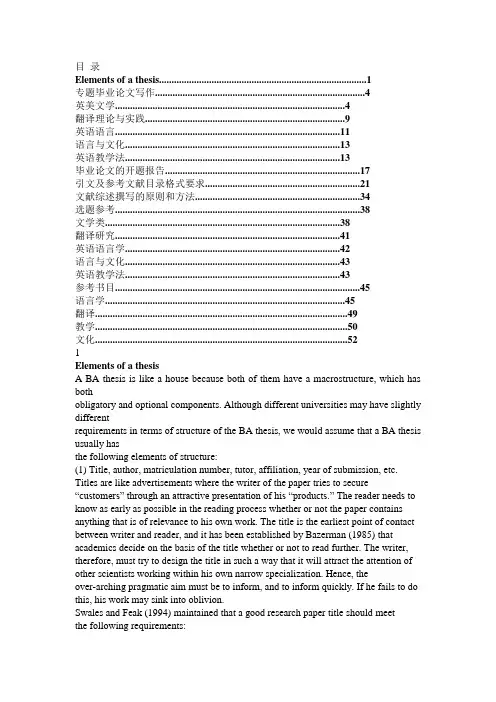
目录Elements of a thesis (1)专题毕业论文写作 (4)英美文学 (4)翻译理论与实践 (9)英语语言 (11)语言与文化 (13)英语教学法 (13)毕业论文的开题报告 (17)引文及参考文献目录格式要求 (21)文献综述撰写的原则和方法 (34)选题参考 (38)文学类 (38)翻译研究 (41)英语语言学 (42)语言与文化 (43)英语教学法 (43)参考书目 (45)语言学 (45)翻译 (49)教学 (50)文化 (52)1Elements of a thesisA BA thesis is like a house because both of them have a macrostructure, which has bothobligatory and optional components. Although different universities may have slightly differentrequirements in terms of structure of the BA thesis, we would assume that a BA thesis usually hasthe following elements of structure:(1) Title, author, matriculation number, tutor, affiliation, year of submission, etc. Titles are like advertisements where the writer of the paper tries to secure “customers” through an attractive presentation of his “products.” The reader needs to know as early as possible in the reading process whether or not the paper contains anything that is of relevance to his own work. The title is the earliest point of contact between writer and reader, and it has been established by Bazerman (1985) that academics decide on the basis of the title whether or not to read further. The writer, therefore, must try to design the title in such a way that it will attract the attention of other scientists working within his own narrow specialization. Hence, theover-arching pragmatic aim must be to inform, and to inform quickly. If he fails to do this, his work may sink into oblivion.Swales and Feak (1994) maintained that a good research paper title should meetthe following requirements:a. The title should indicate the topic of the study.b. The title should the scope of the study (neither overstating nor understating its significance).c. The title should be self-explanatory to readers in chosen area.In some cases, as they added, it may also be helpful to indicate the nature of the study (experiment, case report, survey, ect.)(2) Abstract, one in Chinese, one in English; key words(3) Introduction, which includes brief information concerning the research background, the aimsand objectives, research questions, research method, theoretical framework, data, and thestructure of the thesis .(4) Literature review and theoretical preliminaries(5) Research method, data analysis(6) Results and discussion(7) Conclusions(8) Notes, Appendix, References, AcknowledgementsSome of the elements of structure are obligatory, which means that they must appear in thethesis, while others, notes, appendix, acknowledgements, are optional, that is, they may or maynot appear in the thesis depending on factors such as the nature of the research and the style ofwriting.In terms of the layout and Structure of the thesis, some elements of structure may appear in asingle chapter or section, while other elements may be dealt with in different chapters or sections.For example, in many theses, literature review and theoretical preliminaries each form a single2chapter.The abstractThe abstract is the first section of the paper. It usually comes after the title and before the introduction. The abstract provides an overview of the study based on information from the other sections of the paper. The reader can read the abstract to obtain enough information about the study to decide if they want to read the whole paper. Because it contains elements from the whole paper, it is usually written last.A common way to classify abstracts is by whether they merely describe the overall purpose and methods of the research presented in the document, providing a sense of main topics, or, instead, inform readers of specific details of the research, especially the results and conclusions.The abstract for any article will serve various purposes in the interest of the readers: (1) To indicate to readers quickly whether the full article would be useful to read.(2) To be extracted (or abstracted) from the full article for separate publication.(3) To provide terminology to assist in literature searches by individuals or by literature retrieval specialists for indexes and computer banks.In the process of writing the abstract, every word should be examined carefully to see if more words than needed are being used to narrate the story of one’s research. Also consider the fact that editors and reviewers, seeking initial orientation, are likely to first read a paper’s abstract and that this first impression is “perilously close to a final judgment of your final manuscript”. In informative abstract, the closest attention must be given to the language and the sentences that report the research results, understandably the most important and probably the dominant part of the abstract because they hold the new scientific information.The goal in writing the abstract, as Wilkinson (1991) states, is to convey as much new information as possible to scientists in the same or related discipline in as few words as possible accurately.Since the objective is the most content possible per word, the abstract is thedensest part of the article. Therefore, authors must first reduce drastically the parts to be included, and then they must eliminate wordiness and repetition. Other elements involved in the process of writing abstracts also require attention. These aspects include certain structural and typographical features, the important of using third person, and the consistent use of past tense.Huang Ghadessy and Zhang (2004: 66-67) suggest that there are a number of elements in theabstract which are concerned with answers to the following questions:(1) What is the subject matter/area the research paper is dealing with?(2) What background information is provided by the author(s)?(3) What is the purpose of the present study?(4) How is the research to be done?(5) What are some of the important findings?(6) What are some of the implications of the study?Order of Elements Included in an Abstract(1) some background information,(2) the principal activity (or purpose) of the study and its scope,3(3) some information about the methodology used in the study,(4) the most important results of the study,(5) a statement of conclusion or recommendation.The IntroductionIn the Introduction of a thesis, the following sections are usually expected:(1) rationale for theresearch (or background to the research, reason /motivation of the research), (2) aims andobjectives, (3) research questions, (4) data, (5) research method, (6)theoretical framework, (7)structure of the thesis.The rationale for the research is concerned with the reason, motivation, feasibility, necessity,appropriateness and/or the background information of the proposed research. The underlyingquestion is often along the lines of: “Why do we undertake the present research?”On the other hand, the section on structure of the thesis outlines the structure of the wholethesis.Structure of the ThesisThe thesis is divided into five chapters. In Chapter One, we introduce the theoretical background of the present study, present an outline of the aim and objectives of the study, anddescribe the text to be analyzed. In Chapter Two, we give a general review of the relevanttheoretical concepts to be followed in the study, with the focus on the notion of the TextualFunction, and survey the applications of the Textual Function in discourse analysis as well asits integration with translation studies. In Chapter Three, we examine both the English textand its Chinese translations from the Textual Functional perspective. In Chapter Four, wecompare and discuss the English text and its Chinese translations in terms of the TextualFunction. Finally, in Chapter Five, we summarize the main findings of t, he study and putforward some suggestions for future studies.The literature reviewThe literature review (文献综述) in a BA thesis or an academic paper is part of the secondaryresearch, and its purposes include: (1) to show what has been previously studied in the field andwhat can be improved or modified, (2) to summarize other people’s writings, (3) to define orreview definitions and key concepts, and (4) to clear the ground for your own research.4专题毕业论文写作一、英美文学(一)基本过程1、认真阅读原著研究文学作品,除了反复阅读原著以便熟悉作品本身,还要熟悉作品如下的内容:(1)书名和最初出版的日期;(2)作者的姓名及生卒年代;(3)主要人物的姓名及其主要性格特征;(4)故事中的其他人物及其主要性格特征;(5)故事梗概;(6)故事的叙述者和叙述人称(point of view);(7)故事中描述的事件及事件发生的先后顺序;(8)主导故事的语气,以及作者对于中心人物或主要事件的态度;(9)简要评说故事的写作风格,并用简短的引文予以说明;(10)故事中的讽刺性描写及其在故事中的作用;(11)用一个句子概括故事的主题;(12)如果有的话,说出主要象征及其涵义;(13)对故事总的评价,简要地提出自己的观点。
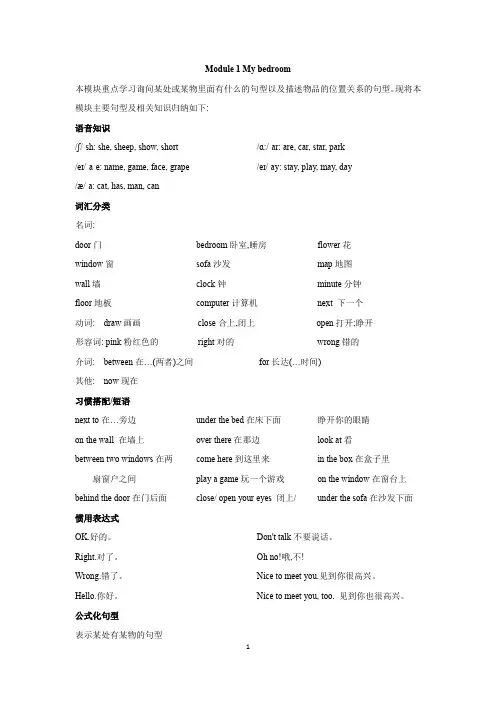
Module 1 My bedroom本模块重点学习询问某处或某物里面有什么的句型以及描述物品的位置关系的句型。
现将本模块主要句型及相关知识归纳如下:语音知识/ʃ/-sh: she, sheep, show, short/eɪ/-a-e: name, game, face, grape /ӕ/-a: cat, has, man, can /ɑ:/-ar: are, car, star, park /eɪ/-ay: stay, play, may, day词汇分类名词:door门window窗wall墙floor地板bedroom卧室,睡房sofa沙发clock钟computer计算机flower花map地图minute分钟next 下一个动词: draw画画close合上,闭上open打开;睁开形容词: pink粉红色的right对的wrong错的介词: between在…(两者)之间for长达(…时间)其他: now现在习惯搭配/短语next to在…旁边on the wall 在墙上between two windows在两扇窗户之间behind the door在门后面under the bed在床下面over there在那边come here到这里来play a game玩一个游戏close/ open your eyes 闭上/睁开你的眼睛look at看in the box在盒子里on the window在窗台上under the sofa在沙发下面惯用表达式OK.好的。
Right.对了。
Wrong.错了。
Hello.你好。
Don't talk不要说话。
Oh no!哦,不!Nice to meet you.见到你很高兴。
Nice to meet you, too. 见到你也很高兴。
公式化句型表示某处有某物的句型There is a picture on the wall. There are two children over there. There are three rulers in the bag.询问某处或某物里面有什么的句型及其答语What’s in your room/the desk/his bedroom?There is a computer/a book. There are two beds.询问某处是否有某人/某物的句型及其答语Is there a flower on the desk? Is there an apple in the kitchen? Are there any maps on the wall.Yes, there is/are. No, there isn’t/aren’t.Module 2 My house本模块重点学习谈论房子和公寓及喜欢做的事情的句型。
关于学生该不该做家务的英语辩论全文共6篇示例,供读者参考篇1Should Kids Have to Do Chores? A Big Debate!Hi there! My name is Jamie and I'm 10 years old. Today I want to talk about a super important topic that kids my age argue about all the time - should we have to do chores around the house or not? It's a huuuuge debate with good points on both sides. Let me break it down for you!On the one hand, I totally get why parents want us to pitch in and help out. Houses can be really messy, especially when you have a bunch of kids running around making messes everywhere. My mom is always nagging me and my little brother to clean up after ourselves. She says it's not fair that she has to do everything while we just lay around playing video games. Chores teach us responsibility and life skills we'll need when we're older and have our own places.Plus, families are supposed to work together as a team. My dad says "Money doesn't grow on trees!" so we all need to contribute in whatever way we can. If my parents cook meals andwork hard at their jobs, the least we can do is keep the house tidy and do a few simple tasks like taking out the trash or doing the dishes. It's only fair that everyone pulls their weight.I have some friends whose parents are super strict about chores. Jacob has to make his bed, load the dishwasher, and tidy his room every single day or else he gets punished. Yikes! Allie's parents make her and her siblings do a weekly "chore rotation" chart where they take turns doing all the household chores. Can you imagine having to mop the floors, clean the bathroom, and do laundry at 10 years old? No thanks!But here's the other side of the debate... We're just kids! Chores take up valuable time and energy that we could be using for much better things...like playing outside, hanging with friends, reading awesome books, or working on super cool hobbies and projects. Childhood is supposed to be a time for learning, exploring the world, and being carefree. Why should we have to waste it scrubbing toilets and doing grunt work?School is already hard enough with all the homework, studying, tests, and strict schedules we have to follow. When we get home, we should be able to relax and recharge our brain batteries. The last thing we need is more responsibilities and nagging from our parents about stupid chores. We'll have ourentire adult lives to be burdened with housework - can't we just enjoy being kids while it lasts?Forcing children to do excessive chores can actually be harmful. It creates unneeded stress, anxiety, and conflict between kids and parents. We shouldn't have to worry about getting punished or yelled at for forgetting boring, trivial tasks around the house. Chores take away from family downtime when we could be bonding over fun activities instead.My friend Marcus says his parents make him do sooo many chores that he has no free time left to just be a kid. Poor Marcus always looks tired and overwhelmed. Frankly, that sounds like a form of child labor to me! Kids have rights too, you know. My philosophy is that we should save the really tough, crummy jobs for teenage siblings and lazy adults who have nothing better to do.So as you can see, there are good points on both sides of the chores debate. Personally, I don't mind doing a few small, quick things to help out like feeding the dog, loading the dishwasher, or taking out the trash. Stuff like that isn't too bad. But I definitely don't think kids should be forced into back-breaking labor or spend hours every day cleaning. We're busy bees with lots of learning, playing, and growing still left to do!At the end of the day, I believe it's all about finding a happy balance. A few light, age-appropriate chores are fine for teaching basic life skills and responsibility. But parents need to be reasonable and not go overboard. Let kids have plenty of free time too! What's your opinion - should kids have to do chores or not? Let me know where you stand in the comments below!篇2Should Students Do Chores? A Heated DebateHey there, friends! It's me, your pal Charlie. Today, I want to talk about a really big deal that's been causing a lot of heated arguments between kids and parents. The question is: should we students have to do chores around the house or not? I've heard kids and grown-ups on both sides getting super worked up about this, so I thought I'd break it all down for you.On one team, you've got the parents and some kids who think we absolutely, positively, no-doubt-about-it SHOULD be doing chores. They give us a bunch of reasons why, like:It teaches us responsibility. Grown-ups are always going on about how important it is to be responsible. Well, what better way to learn that than by having to take care of tasks around thehouse? If we get used to doing chores now, they say, it'll make us into responsible adults later.It's only fair that we pitch in. After all, our parents work really hard all day at their jobs to earn money for our家庭. Then, they come home and have to do a ton of housework too! That doesn't seem quite right, does it? Shouldn't we be helping out and doing our part?Doing chores helps us appreciate how much work goes into running a household. Our parents say it's easy for us kids to take clean clothes, cooked meals, and a tidy house for granted when we don't have to lift a finger. But if we actually have to do some of those tasks ourselves, maybe we'll be more grateful for everything they do.It gets us into good habits. Making your bed, washing dishes, cleaning your room - those are all habits our parents want us to build from an early age. That way, we'll keep doing them as we get older instead of being a sloppy mess!So those are some of the major arguments from Team Chores. They seem to make some decent points, don't they? But don't go joining their side just yet! We've got our own powerful arguments against having to do chores. Here's our team's way of seeing it:A) We're just kids! Isn't it a bit much to expect us to do tedious housework at such a young age? Our job is to learn, play, and enjoy our childhoods while we can. Piling too many responsibilities on us can lead to stress.B) It's not our mess, so why should we have to clean it up? We don't make the biggest messes around the house - that's usually our parents' doing from cooking, hosting guests, etc. So why should we get stuck with cleaning up after them?C) We're already incredibly busy with school, homework, activities, and being kids in general. Adding time-consuming chores to our loads is just too much. Our schedules are packed enough as it is!D) Doing chores takes away from important playtime and chances to use our creativity. Instead of scrubbing floors, we could be outside riding bikes, exploring the woods, or using our imagination. Those seem like better ways to spend our childhoods, don't you think?As you can see, this is an issue with two very different sides and some pretty compelling points from both teams. Personally, I kind of go back and forth on where I stand. On one hand, I do think it's important to start building good habits and takingsome responsibility at my age. But on the other hand, being a kid is already a full-time job in itself!What's your take on the nice debate? Should we kids have to spend time every day cleaning, washing dishes, doing laundry, and helping out around the house? Or should we be free to focus on being kids while our parents handle all the household duties? It's a tough call!I don't have all the answers, but I do know this - whether we end up on Team Chores or Team No Chores, we should still listen to our parents. Even if we disagree with them sometimes, they've got a lot more life experience than we do. Our job is to work hard, have fun, and keep an open mind. The adults' job is to guide us and decide what's best.At the end of the day, I think open communication is key. If parents actually explain their reasoning instead of just barking orders, maybe we kids will be more willing to pitch in. And if we kids share our perspective respectfully, maybe parents will be more understanding of our side too.It's definitely not an easy debate to settle. But I'm sure if we approach it with patience, good humor, and some empathy for each other's point of view, we can figure out what's fair. A littlecompromise might be a good solution - like we kids do SOME chores around the house but not too overload us.What do you all think? I've said my piece, but I want to hear your take! You can let me know where you stand on this heated debate. Just remember, whether you're pro-chores oranti-chores, be sure to clean your room first - mom and dad's orders! Until next time, thanks for joining me in taking a look at this super controversial topic. This has been Charlie, signing off!篇3Title: To Chore or Not to Chore? A Kid's PerspectiveBeing a kid is tough work, you know? We have to go to school, do our homework, and try to squeeze in some playtime too. But then our parents come along and add chores to the mix! Ugh, talk about a total buzzkill. But I guess we have to look at both sides of the story before deciding if kids should have to do chores or not.Let's start with the case against chores. First of all, we're just kids! We're supposed to be having fun, playing games, and enjoying our childhood. Chores are boring and take away from our precious playtime. It's like our parents are trying to turn usinto little adults or something. Plus, we already have to work hard at school all day. Isn't that enough work for a kid?Another big problem with chores is that they can be really hard and tiring. I mean, have you ever tried to vacuum an entire house? It's exhausting! And don't even get me started on doing the dishes – those things are always so greasy and gross. Yuck! Kids shouldn't have to struggle with tough tasks like that.But now let's look at the other side of the argument. Some parents might say that chores teach us important life skills and responsibility. By doing chores, we learn how to take care of ourselves and our living spaces. That's a fair point, I guess. After all, we can't expect our parents to do everything for us forever.Chores can also help us appreciate the hard work our parents do around the house. It's easy to take things for granted when someone else is always cleaning up after us. But when we have to do those chores ourselves, we start to understand how much effort goes into keeping a house running smoothly.Another argument for chores is that they can help build character and a strong work ethic. By learning to do chores at a young age, we develop good habits that will serve us well in the future. Employers like to see people who are responsible and not afraid of hard work, right?So, what's the verdict? Should kids have to do chores or not? Honestly, I think the answer lies somewhere in the middle. Chores shouldn't be too difficult or time-consuming, especially for younger kids. But a few small, age-appropriate tasks could be beneficial.For example, maybe younger kids could be responsible for making their beds and picking up their toys. As we get older, we could start helping with light cleaning tasks like dusting or sweeping. And by the time we're teenagers, we might be ready to tackle bigger chores like mowing the lawn or doing laundry.The key is to start small and make sure the chores are reasonable for our age and ability level. That way, we can learn valuable skills without feeling overwhelmed or resentful towards our parents.At the end of the day, life is all about balance. We need time to play and be kids, but we also need to learn responsibility and how to contribute to our households. Chores might not be the most fun thing ever, but they're a part of growing up and becoming a well-rounded person.So, parents, go ahead and assign us some chores – but don't go too crazy, okay? And kids, let's try to have a positive attitudeand do our part to help out around the house. After all, we're all in this together, and a little teamwork can go a long way.篇4Title: Should Students Do Household Chores? A Lively Debate!Hey there, fellow students! Today, we're going to dive into a hot topic that's been buzzing around our playgrounds and classrooms – should we be doing household chores or not? It's a question that's been sparking some heated debates, and I'm here to lay it all out for you.First things first, let's talk about the team that says "Yes, we should do chores!" These guys argue that helping out around the house is a great way to learn responsibility and develop essential life skills. Imagine being a grown-up and not knowing how to do laundry, cook a simple meal, or even make your bed? That's a recipe for disaster!They also claim that doing chores teaches us the value of hard work and appreciation for the efforts of our parents or caregivers. After all, they work tirelessly to keep our homes clean and organized, so pitching in is the least we can do.But wait, there's more! The pro-chores crew believes that by contributing to household tasks, we become more independent and self-reliant. Plus, it's a fantastic way to bond with our families and create lasting memories (who doesn't love the occasional dance party while vacuuming?).On the flip side, we have the "No way, chores are a bore!" team. These rebels argue that childhood should be all about playing, learning, and having fun. They believe that piling on chores is just adding unnecessary stress and robbing us of precious time that could be spent on more enjoyable activities, like hanging out with friends or pursuing our hobbies.Additionally, they claim that chores can be a distraction from schoolwork and extracurricular activities, which are crucial for our academic and personal development. Why should we have to worry about washing dishes or mowing the lawn when we've got tests to study for and clubs to attend?But that's not all! The anti-chores squad also argues that household tasks should be the responsibility of parents or caregivers, as they're the ones who ultimately benefit from a clean and well-maintained home. After all, we're just kids, and our primary focus should be on growing, learning, and having fun.Now, let's break it down a bit further. One of the strongest arguments from the pro-chores camp is that doing chores instills a sense of responsibility and accountability. By having regular tasks and expectations, we learn to manage our time, prioritize our responsibilities, and develop a strong work ethic – all essential skills for success in life.On the other hand, the anti-chores crew counters that these lessons can be learned through other means, such as school projects, extracurricular activities, or even simple tasks like keeping our rooms tidy.Another point of contention is the issue of fairness. Thepro-chores team argues that by sharing household responsibilities, we're contributing to the overall well-being of our families and creating a more equitable distribution of labor. But the anti-chores side claims that imposing chores on children is inherently unfair, as we didn't choose to be born into these families and shouldn't be burdened with household tasks.Personally, I can see valid points on both sides of this debate. While I agree that doing chores can teach us valuable life skills and foster a sense of responsibility, I also understand the desire to have a carefree childhood and not be overwhelmed with too many responsibilities.Perhaps the solution lies in finding a balance – a reasonable amount of age-appropriate chores that don't interfere with our studies or playtime. After all, we're still kids, and our primary focus should be on learning, growing, and having fun.At the end of the day, it's up to each family to decide what works best for them. Some may prefer a more structured approach with clearly defined chores, while others may opt for a more relaxed and flexible system.Regardless of where you stand on this issue, it's important to respect each other's perspectives and have open and honest conversations about it. Who knows, maybe we can even come up with some creative solutions that make chores a little more fun and engaging (chore charts with rewards, anyone?).So, there you have it, folks! The great chore debate laid out in all its glory. Whether you're a die-hard member of thepro-chores crew or a proud advocate of the anti-chores squad, one thing is certain: this discussion isn't going away anytime soon.But hey, that's what makes life interesting, right? We all have different opinions and perspectives, and that's what makes our world such a vibrant and diverse place.So, keep those debates going, keep an open mind, and most importantly, remember to have fun and enjoy your childhood –whether that includes chores or not!篇5Should Students Do Chores?Hello everyone! Today, I want to talk about an important topic: whether students should do chores at home. Some people say it's important for us to help with household tasks, while others believe that our main responsibility is studying. Let's explore both sides of the argument.Firstly, doing chores can help us learn valuable life skills. By helping with tasks like cleaning our rooms, washing dishes, or taking care of pets, we become more responsible and independent. These skills will be useful when we grow up and have our own homes. Plus, doing chores teaches us the importance of teamwork and cooperation as we work together with our family members.Secondly, doing chores can teach us time management. When we have to balance our schoolwork and chores, we learn how to prioritize and manage our time effectively. This skill will benefit us not only in school but also in our future careers. Bylearning to juggle different responsibilities, we become more organized and better at managing our tasks.On the other hand, some people argue that students should focus solely on their studies. They believe that doing chores can distract us from our academic responsibilities. However, it's important to remember that doing chores doesn't mean spending all our time on them. By allocating a reasonable amount of time for chores, we can still prioritize our studies and excel academically.Moreover, doing chores can actually help us relax and relieve stress. After a long day of studying, engaging in physical activities like sweeping or gardening can be a refreshing break. It allows our minds to unwind and helps us maintain a healthy work-life balance. By taking short breaks to do chores, we can return to our studies with renewed focus and energy.In conclusion, I believe that students should indeed do chores at home. By doing so, we learn important life skills, develop a sense of responsibility, and improve our time management abilities. It's all about finding the right balance between our academic responsibilities and household tasks. So let's embrace the opportunity to contribute to our families and become well-rounded individuals.Thank you for listening!篇6Should Students Do Chores at Home? A Kid's DebateHi everyone! My name is Jamie and I'm a 4th grader. Today I'm going to share my thoughts on a really important question - should kids have to do chores at home or not? It's a pretty big debate between kids and parents. Let me tell you the key arguments on both sides.Why Kids Shouldn't Have to Do ChoresWe're already working hard at school all day!After a long day of lessons, homework, tests, and trying to pay attention, the last thing we want is more work at home. School is our job as kids, so home should be a break. Chores just add more to our workload.Chores take away from important kid time.We need plenty of time to play, be creative, get exercise, spend time with friends and family, and just be kids! Chores cut into that crucial free time when we recharge our batteries.We don't get paid for chores.Parents work hard at their jobs and get paid. We work hard at school and just get graded. If we have to do household chores too, we should at least get an allowance for that "job."We make more of a mess than adults.Let's face it, kids are naturally messier than grown-ups. We drag in dirt, drop food, make craft messes, and leave toys everywhere. Having us clean it all up is unrealistic and unfair.We're not good at chores.Kids lack the skills, strength, and attention span to do a good job on big chores like laundry, yard work, or deep cleaning. We'll probably just make more work for parents having to redo it all.Why Kids Should Do ChoresChores teach important life skills.Things like cleaning, cooking, laundry, and basic maintenance are skills everyone needs to run a household someday. It's better to learn hands-on as a kid rather than being clueless as an adult.Chores build responsibility.Having regular chores assigns kids with responsibilities and accountability. It shows we can take ownership and follow through on tasks without constant reminders.Chores promote teamwork.It takes a team effort to run a household smoothly. Doing our part with chores teaches kids how to be contributing members of a family team.Chores humble kids.A little housework gives kids perspective. We see how much effort goes into tasks we take for granted, like having clean dishes, fresh laundry, and a neat living space.Chores mean quality family time.Doing chores together, especially bigger tasks like yard work or house projects, gives families quality time working as a unit and strengthening bonds.My PerspectiveThose are the major points on both sides, but what do I think? Well, I'll be honest - chores aren't my favorite! I'd much rather be playing basketball or watching TV after school. And some choreslike cleaning my room or unloading dishes seem so boring and unnecessary.But I also understand why my parents want me to pitch in. Our household runs smoother when we all lend a hand. And skills like doing laundry, making simple meals, and keeping spaces clean will be expected of me as a teen and adult.So while I don't love chores, I know they're important for building discipline, sharing responsibilities, and learning independence. As long as my chores aren't too overwhelming, I can agree they're valuable in the long run. Maybe chores and I will never be best friends, but we can coexist!The bottom line is, kids shouldn't have to work like full-time maids. But we also shouldn't expect parents to do absolutely everything for us. A balanced chore load, with clearly explained duties and reasonable expectations, can be a fair compromise. It allows us to chip in around the house while still having plenty of free kid time.What do you guys think about kids doing chores? Whether you're a kid or a parent, I'd love to hear your perspective! Let's discuss this further in the comments.。
为什么学生应该学做饭英语作文思路带孩子走入厨房,其实是帮助孩子养成健康、规律饮食习惯的有效办法。
首先,就是困扰很多低龄段孩子父母的问题——挑食。
当孩子亲自参与到做饭的过程当中,自己挑选蔬果、肉类,把调味料放入菜里,他会认为做好的菜是自己的结晶,这会促使孩子们接受并尝试不同的菜品。
所以对于挑食的孩子,父母不妨引导孩子参与到烹饪过程中,即使是做很简单的工作、例如揉面团、撒盐等,也会起到意想不到的效果。
第二点是有关饮食均衡、健康饮食。
当父母带孩子进入厨房,和他们一起做菜的时候,父母可以和孩子讨论不同食物相关的知识。
比如“西红柿为什么是红色的、“鸡蛋的蛋白和蛋黄的营养成分有什么区别”,这可以让孩子在学习做饭的历程中学习到很多知识,帮助他们了解每一餐的营养搭配,养成终身受益的健康饮食方式。
例Starting this fall,the labor class will become an independent course in primary and secondary schools.And learning to cook is one of the courses.Do you know why children should learn to cook?He res reasons:First,cooking is conducive to the training of thinking ability Second,cooking is conducive to parent-child communication Third,cooking is conducive to the cultivation of hands-on ability Fourth,cooking is conducive to children's self-confidence It can be seen that labor is an indispensable and important factor in the process of students'physical and mental health development.。
儿童英语口语学习:做饭Let's cook dinner! 让我们做晚饭吧!What will we make? 我们做什么好呢?Let's make pizza and salad. 我们就做比萨和沙拉吧。
How nice! Pizza and salad for dinner. 太好了,晚上吃比萨和沙拉.Let's make some more. 我们再做一些吧。
What should I make for dinner? 晚饭做什么好呢?Mom, what are we going to make tonight?妈妈,我们今晚要做什么菜?Curry and rice. What do you think? 咖喱饭。
你觉得呢?That sounds nice. I can peel the potatoes first.听起来不错。
我能够帮忙先把马铃薯削皮。
Really! Oh, honey, you are so sweet. I'll chop up this carrot.真的?喔,亲爱的,你真是贴心。
那我来把胡萝卜切丁。
Is breakfast ready? 早餐做好了吗?I'm cooking. 我在做呢.Yes, It is. 做好了.Not yet. 还没呢。
How soon can you get it ready? 还要多久才能做好呀?How soon will it be done? 还要多久才能做好呀?I'll be ready in a few minutes. 再过几分钟就好了。
In about five more minutes. 再有5分钟吧。
How's it going, mom? 饭做得怎么样了,妈妈?Just great. Almost done. 好了。
快做完了。
You can eat just as soon as this soup cools down.等汤一凉下来,你就能够吃了。
孩子学英语,不是盖房子,而是煮米饭家长经常听到一个比喻:“学英语就像盖房子,单词就是砖头瓦片,语法就是房屋结构,单词加语法,就盖起英语的房子”。
因此,一些家长期望给孩子找到背单词的办法,以为孩子苦背单词,苦学语法规则,就能掌握英语。
这就错了,学英语可不是盖房子。
英语,是堆砌不出来的。
学英语,是一种熏陶、是一种浸泡。
学英语,像电饭锅煮米饭,泡在水里,环境高温,时间不久,米饭自然煮熟。
类似“学英语,无外乎背单词,学语法”的观点,半个世纪之前,就有人说过。
上世纪 50 年代后期,我国处在社会主义“大跃进”期间,各行各业都在制定 15 年之内赶超英国的目标。
英语教学也要大跃进,提出了“50小时赶 3 年”的口号。
用 50 小时,达到 3 年的英语教学目标。
有些人认为 50 个小时还是多,建议能不能让学生用 15 个小时,达到 3 年的英语教学目标。
对于这段历史,2003 年,复旦大学董亚芬教授在《外语界》撰文表示:这些鼓吹英语速成的人,以为学生只要记下单词,外加一些语法规则,就可以学好英语,这背离了外语教学规律。
也许有人会问,学英语,难道不该重视单词、语法吗?当然要重视单词语法。
国外语言学家说过一句话:没有语法,我们无法正确表达;没有单词,我们就什么都无法表达。
但是,死记硬背单词语法,是费力不讨好。
我见过一些小学生,认认真真背单词,一边背,一边还使用词根法、词缀法、谐音法、象形记忆法等等辅助记忆方法。
小孩刻苦学习的精神,值得表扬。
但要注意一点,单词是有脾气的,单词是有弹性的。
从背单词,到掌握单词,就像从认识一个人,到了解一个人,中间要有一个过程。
比如,孩子今天认识“马”这个单词。
但是,到什么时候才算掌握“马”这个单词?那就是,孩子在翻书的时候,读到过“乘坐马车”、“马马虎虎”、“修理马达”、“马到成功”,孩子通过阅读,反复看到“马”在不同语言环境下出现,看到“马”的各种搭配组合,才有可能掌握“马”这个词。
小学生做饭的英语作文小学生做饭的英语作文(精选11篇)在平时的学习、工作或生活中,大家一定都接触过作文吧,作文是人们以书面形式表情达意的言语活动。
你所见过的作文是什么样的呢?下面是小编收集整理的小学生做饭的英语作文,仅供参考,欢迎大家阅读。
小学生做饭的英语作文篇1Last night, my parents told me that they would go to have dinner with friends, so they wouldn’t stay at home and let me to buy something to eat by myself. I played computer games for a long time and when I got tired, I found it was almost eight o’clock. I didn’t want to go out, so I opened the fridge, there were many stuffs for me to make dinner. I had never done it before, I only watched my mother cook, but I still wanted to try.I made a fire and put the meat in the pan, the flavors were also mixed in it. When the meat almost got black, I finished. Whe I tasted, I realized the meat was over cooked. I must learn to cook. 小学生做饭的英语作文篇2In my life there are many for the first time, such as the bus first charge card to help his mother, the first power supply bureau to pay the electricity bills ... ... but I remember most is the first time to cook. Summer vacation, a cousin to my house to play, call out my cousin all day, that food is not good, always splitting hairs. One morning, my mother suddenly announced at noon by me and the cousin to cook, we suddenly stupid, because we've never done rice. But I still bite the bullet and cousin agreed. I quickly find a recipe, a variety of recipes in the tens, we chose to do it simple and we all love to eat tomatoes scrambled eggs. We went to great lengths well be considered a food, not so easy to cookand then we no longer afraid of the picky eaters.小学生做饭的英语作文篇3I have to admit that delicious food not only can satisfy my stomach but also can let me love cooking. When I eat some very tasteful food I will think about how to make the food. Personally I have tremendous interest in cooking.During my cooking period I once succeeded in cooking very delicious food and meanwhile I also experienced failures. However I never regret loving cooking. Cooking makes my daily life more substantial.From cooking I also can learn some knowledge about health.I always look through the cooking websites to find new ways to make food. When I look at these websites I can find out that there are many little healthy knowledge of daily life.Cooking makes me more confident to live. From cooking I can learn unique life attitude. I love cooking.小学生做饭的英语作文篇4Meatballs with carrot slices in soup Alex, since there is only one response and this one is not satisfying, I figured out something for fun. I learnt this from my roommate in college. It is very simply and you don't find it in any of the fashionable restaurants. But it is old-fashioned as you require. And it is delicious at that.Buy a pound of minced meat in a supermarket. Add salt, ginger powder, sliced onion, a little flour, and two spoonfuls of water. Stir the thing vigorously for two minutes. Boil a pot of water. Make a dozen meatballs out of the mixture you've prepared. Put the balls into boiling water. When the water boils again, add sliced carrot. Add salt and pepper to your taste. The soup is ready to serve.Homemade and crude as it is, you never forget the taste!小学生做饭的英语作文篇5Today,I learn how to cook at home with my mother.I wash the good rice cooker first,put two cups of rice,add some water to rub a rub,pour out the water. Flushing put some water,and then poured some water,and then,put some good water filter. Clean the bottom of the pot of water,put in the cooking pot,closed the rice pot,open the power switch,press the button to go cooking.After the meal cooked,I installed a bowl of rice,tastes,very delicious!Even mom and dad also full of praise!今天和妈妈一起在家学做饭。
新概念英语青少版Unit 18 Lesson 35: Men can cook, too! 男⼈也能做饭William: Let’s cook dinner, Robert. You can help me. Give me some rice, please. There’s some rice in that jar. Put some water in the pan, and pass me a knife, please.我们来做饭吧,罗伯特,你来帮忙我吧,给我点⽶,⽶在哪个罐⼦⾥。
在平底锅⾥放点⽔,然后把⼑递给我。
Robert: Which one?哪把⼑?William: That one on the table.桌⼦上的那把。
Robert: OK, Dad. Here it is.好的,爸爸,给你。
William: Chop two onions, please.切两个洋葱。
Robert: OK, Dad. Chop two onions…好的,爸爸,切两个洋葱....William: Is there a big spoon over there?那边有个⼤勺⼦吗?Robert: Yes, Dad.是的,爸爸。
William: Pass me the big spoon, please.把那个⼤勺⼦给我。
Robert: I can’t get a spoon and chop an onion, Dad!爸爸我不能⼜切洋葱⼜拿勺⼦。
William: You’re right. What about some plates?说的对,那边有盘⼦吗?Robert: Dad, there are some plates on the shelf. There are some knives, some forks and some spoons in the drawer. And my hands are wet.爸爸,架⼦上有盘⼦。
1孩子学英语不是盖房子而是煮米饭( 李岑讲读原版书)
家长经常听到一个比喻:“学英语就像盖房子,单词就是砖头瓦片,语法就是房屋结构,单词加语法,就盖起英语的房子”。
因此,一些家长期望给孩子找到背单词的办法,以为孩子苦背单词,苦学语法规则,就能掌握英语。
但是,学英语不是盖房子。
英语,是堆砌不出来的。
学英语,是一种熏陶、是一种浸泡。
学英语,像电饭锅煮米饭,持续高温,时间一到,米饭自然煮熟了。
类似“学英语,无外乎背单词,学语法”的观点,半个世纪之前,就有人说过。
上世纪50年代后期,我国处在社会主义“大跃进”期间,各行各业都在制定15年之内赶超英国的目标。
英语教学也要大跃进,提出了“50小时赶3年”的口号。
用50小时,达到3年的英语教学目标。
有些人认为50个小时还是多,建议能不能让学生用15个小时,达到3年的英语教学目标。
对于这段历史,2003年,复旦大学董亚芬教授在《外语界》撰文表示:这些鼓吹英语速成的人,以为学生只要记下单词,外加一些语法规则,就可以学好英语,这背离了外语教学规律。
也许有人会问,学英语,难道不该重视单词、语法吗?当然要重视单词语法。
国外语言学家说过一句话:没有语法,我们无法正确表达;没有单词,我们就什么都无法表达。
但是,死记硬背单词语法,是费力不讨好。
我见过一些小学生,认认真真背单词,一边背,一边还使用词根法、词缀法、谐音法、象形记忆法等等辅助记忆方法。
小孩刻苦学习的精神,值得表扬。
但要注意一点,单词是有脾气的,单词是有弹性的。
从背单词,到掌握单词,就像从认识一个人,到了解一个人,中间要有一个过程。
比如,孩子今天认识“马”这个单词。
但是,到什么时候才算掌握“马”这个单词?那就是,孩子在翻书的时候,读到过“乘坐马车”、“马马虎虎”、“修理马达”、“马到成功”,孩子通过阅读,反复看到“马”在不同语言环境下出现,看到“马”的各种搭配组合,才有可能掌握“马”这个词。
没有大量阅读,光背一点单词,意义不大。
杨绛先生说过,掌握单词就像交朋友。
这是一个很妙的比喻。
背5个单词,就像认识5个人,光拿花名册,死记硬背这5个人的名字,意义不大。
但是,如果我能和这5个人朝夕相处,自然会加深对他们的了解,自然就记住了他们的名字。
就这个比喻,我想提一句“词汇附带习得”,这个理论是1987年由3名国外学者提出来的。
“词汇附带习得”对我们的启示,就是学习者专心阅读的时候,虽然没有刻意记单词,但却记住了单词。
孩子津津有味阅读Harry Potter的时候,单词不知不觉就记住了。
另外,孩子阅读一整本书,还有一个特别的好处。
作家写一本书的时候,
必然会重复使用一些单词和句型结构,所以孩子阅读一整本书,前面见到的单词、句型结构,后面读的时候,会再次见到,自然而然强化了记忆。
所以说,单词量大的孩子,都是读书读出来的。
有些家长认为,只要文章没生词,孩子就能又快又好地阅读英语。
事实并非如此。
孩子想要又快又好阅读英语,需要专门的训练。
香港圣保罗学校附属小学,一群六年级的孩子,英文阅读很流畅,半个月能读完300多页的原版书。
这些孩子都掌握了“词块”阅读能力,他们阅读的时候,一眼看下去,看的不是一个单词,而是一连串好几个单词。
国内英语优秀的孩子,一个晚上能翻阅十几页原版书,也是因为有这样的阅读能力。
再有,光背单词不读书的孩子,一旦接触英文原版读物,会发现即使手头有字典,阅读过程还是卡卡的。
就像吃鱼的时候,嗓子不断卡鱼刺。
这是为什么呢?因为阅读的过程,不是认字的过程。
阅读的过程,是“从字里看出字来”的过程。
阅读,是读者,对文本作出解释的过程。
举个例子,有学生觉得鲁迅的文章难懂,不是因为不认识鲁迅写的汉字,而是无法解释鲁迅汉字背后的内容。
越是优秀的作品,越是在有限的文字内,蕴含丰富的解释。
我再说说语法,语法是人工总结的语言规则,是语言中最枯燥的部分,是最容易挫伤孩子学习兴趣的部分。
语法是有必要学的,但是学好语法,有一个前提,孩子先要有大量语言接触。
孩子学英语的重心,应该放在语言上,而不是放在语法上。
孩子学的是英语,而不是学英语的规则。
孩子应该learn English, 而不是learn about English,就像孩子学游泳,应该进到水里玩,而不是一直在岸上学习枯燥的游泳理论。
比如,香港小学6年级英语全港测评,翻开试卷,里面没有一道语法选择题,却有一首20行的英文诗。
其实,语法是隐含在语言里面的,我们只要大量接触原汁原味的英语,附带就能掌握语法。
这就是语法内隐式学习。
“内隐”的概念,是美国心理学家瑞博1965年首次提出的。
孩子大量阅读漂亮的英语,孩子英语自然就很漂亮。
在最高意义上,英语教学是培养一种趣味,培养孩子对英语的审美。
单词、句型、语法,只有在文学作品里,才附着万千气象。
孩子学英语,不可以沉闷。
孩子学英语,应该是自身需要之满足,而不是满足别人的需要。
仅仅是背单词、扣语法、做卷子,不去亲近文学,就像孩子们不去辽阔的草原,欣赏鹰击长空之美感,孩子们整天关在狭窄屋子里,盯着老鹰的标本。